Abstract
It has been proposed that anti-inflammatory actions of corticosteroids rely on promotion of a natural peptide phospholipase A2 inhibitor, lipocortin, but in vivo effects on arachidonic acid metabolism have not been shown. Equilibrium dialysis of the rectum in patients with ulcerative colitis was used to determine whether cyclooxygenase and lipoxygenase products released from the inflamed rectal mucosa could be differentially inhibited by systemic treatment with prednisolone and indomethacin, respectively. In 10 patients with severe disease luminal concentrations of prostaglandin E2, prostaglandin F2 alpha, and leucotriene B4 were markedly raised (p less than 0.05) on comparison with 10 healthy controls, and they decreased significantly (p less than 0.05) within 72 hours after administration of prednisolone 1.5 mg/kg/day orally. In contrast prostaglandin, but not leucotriene B4 concentrations decreased (p less than 0.05) within 72 hours after administration of indomethacin 150 mg/day in another 10 patients with distal disease. These prompt reductions in concentrations of arachidonic acid metabolites more likely are caused by direct drug actions, rather than being secondary to decreased tissue damage. The data accord with the theory explaining anti-inflammatory effects of corticosteroids through lipocortin activity and support the belief that leucotrienes are more important than prostaglandins as mediators of inflammation in ulcerative colitis.
Full text
PDF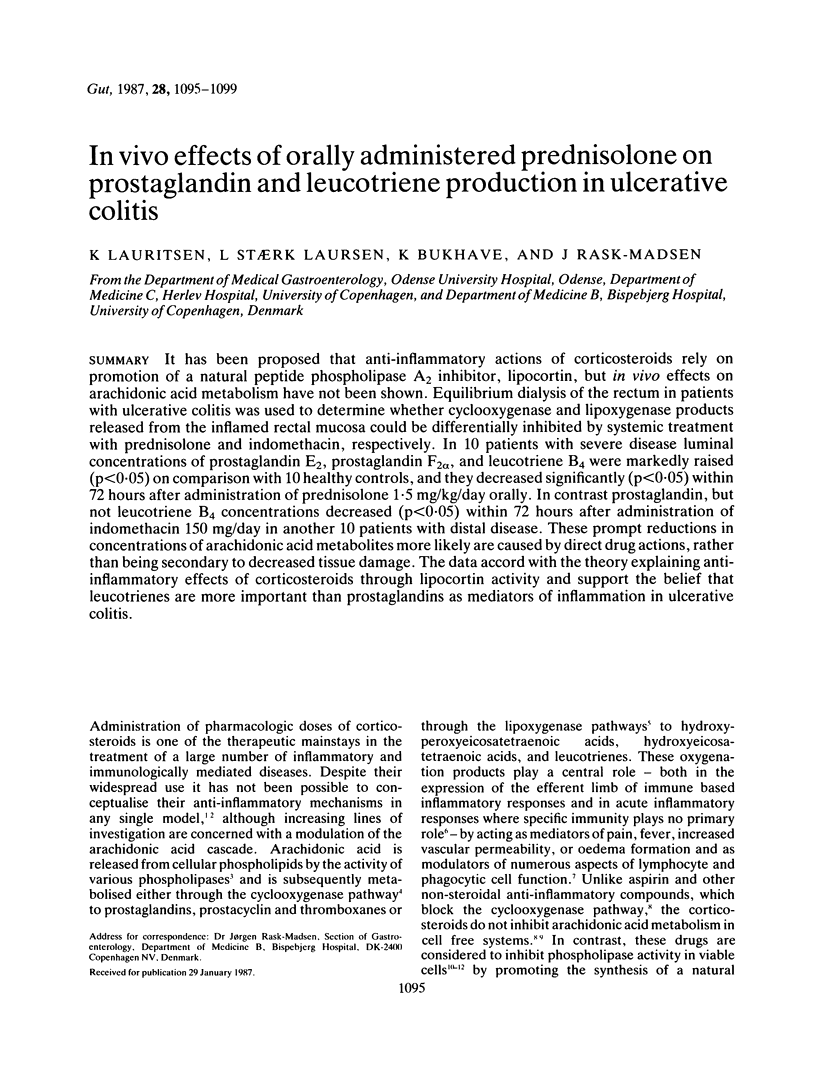
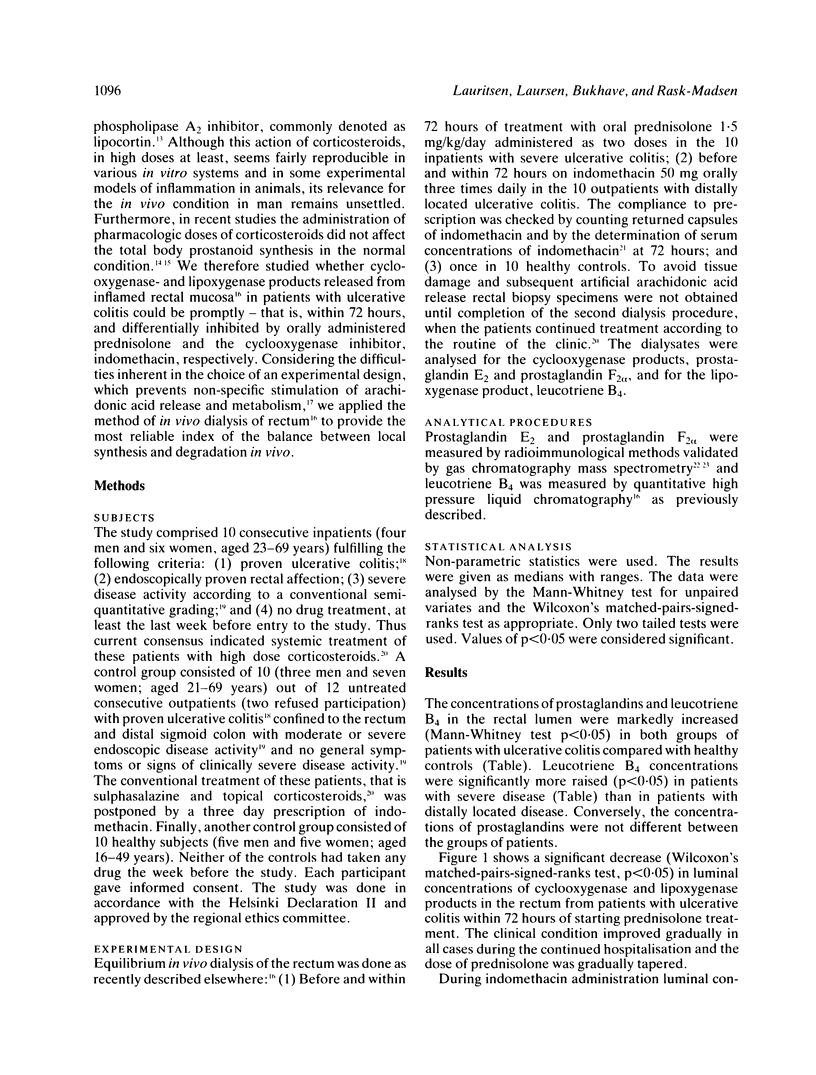
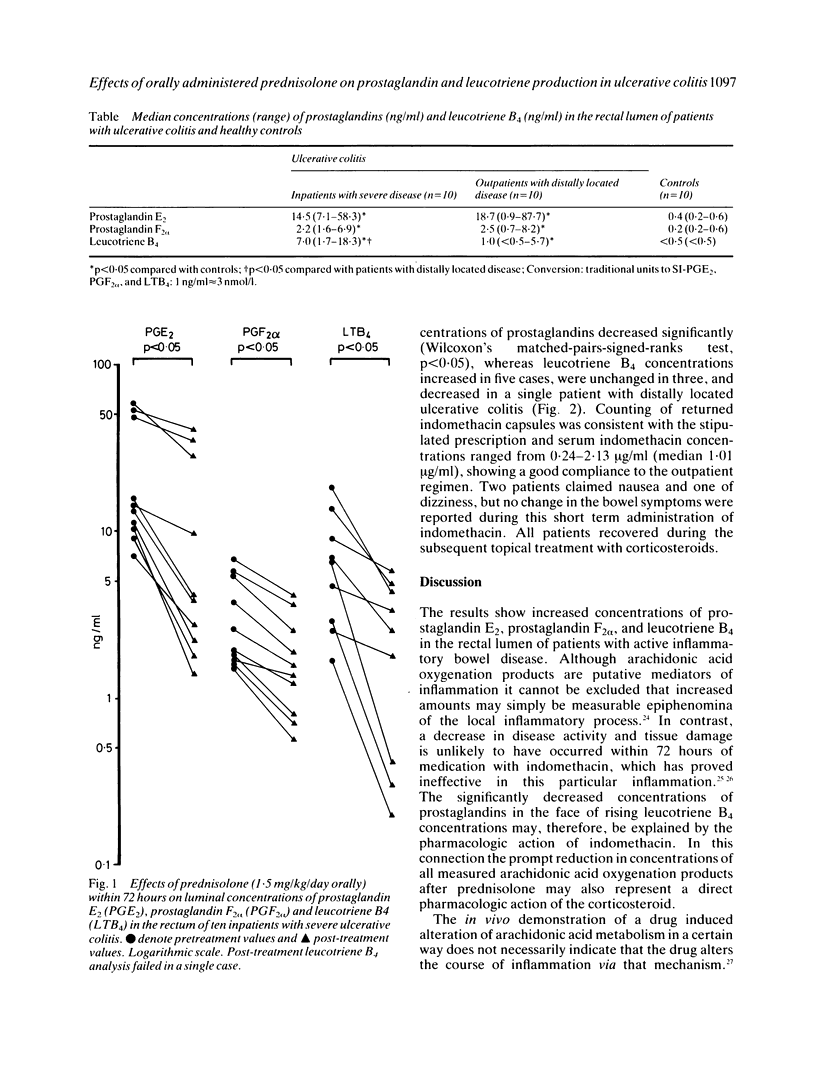
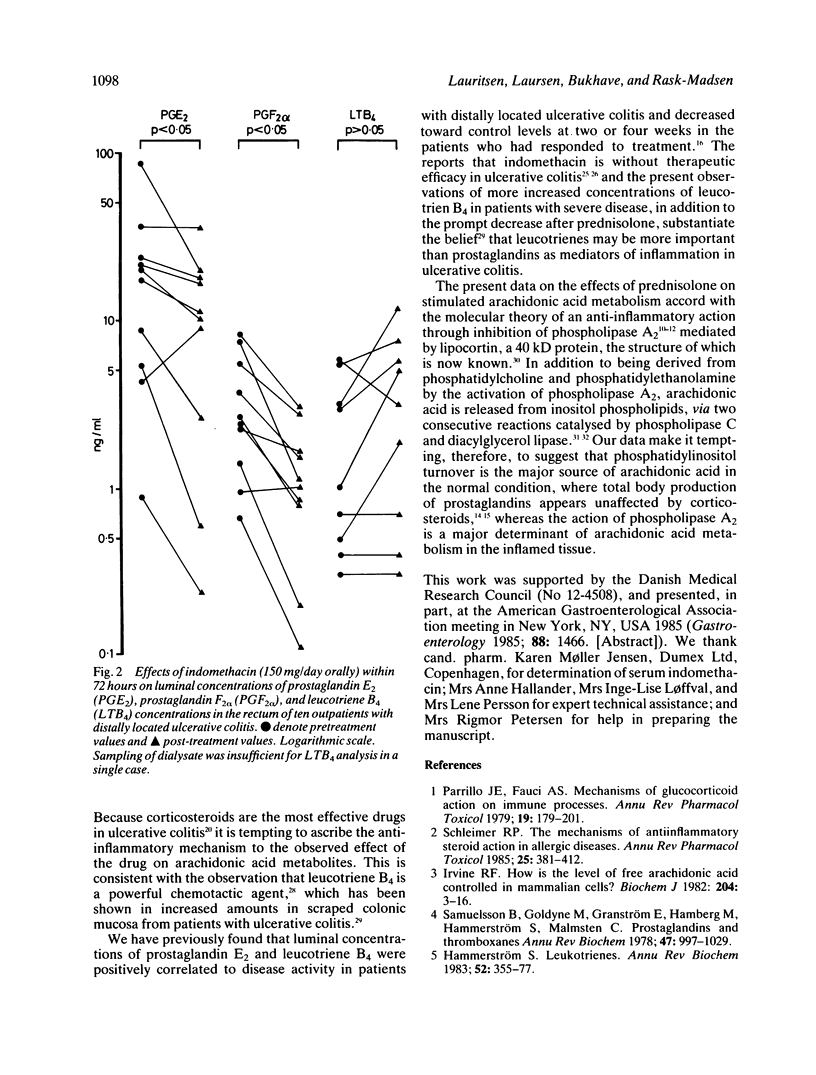
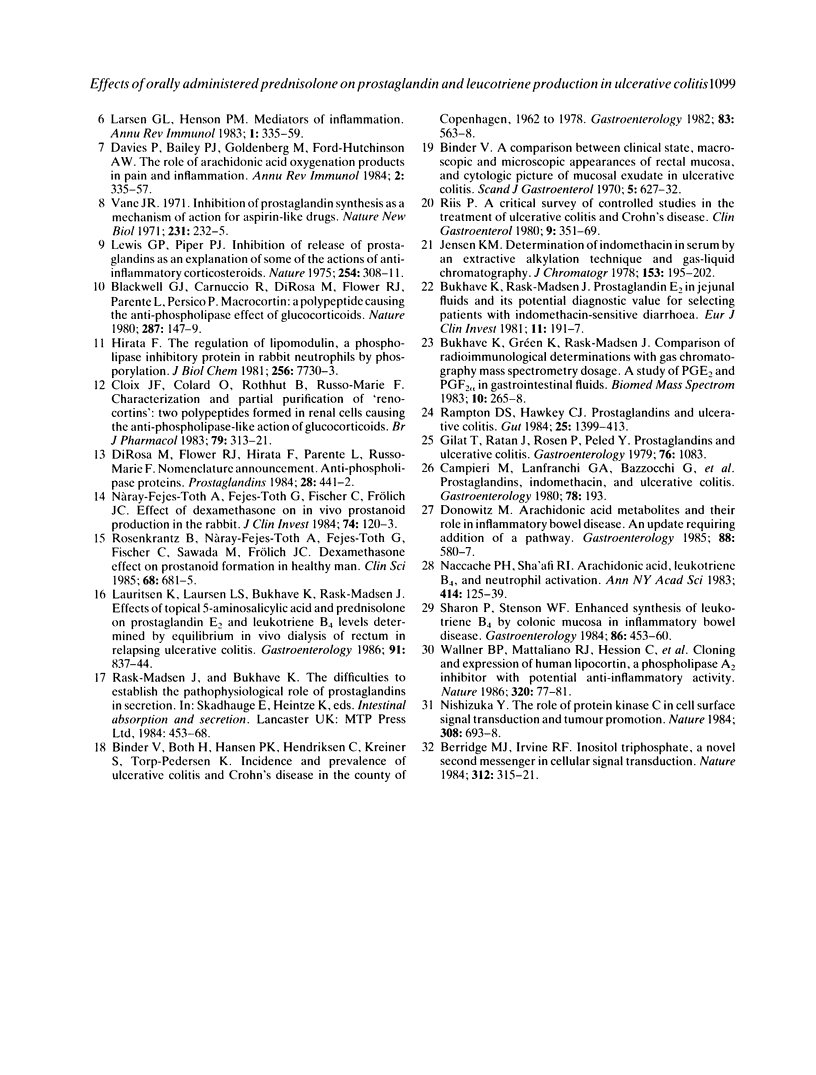
Selected References
These references are in PubMed. This may not be the complete list of references from this article.
- Berridge M. J., Irvine R. F. Inositol trisphosphate, a novel second messenger in cellular signal transduction. Nature. 1984 Nov 22;312(5992):315–321. doi: 10.1038/312315a0. [DOI] [PubMed] [Google Scholar]
- Binder V. A comparison between clinical state, macroscopic and microscopic appearances of rectal mucosa, and cytologic picture of mucosal exudate in ulcerative colitis. Scand J Gastroenterol. 1970;5(7):627–632. [PubMed] [Google Scholar]
- Binder V., Both H., Hansen P. K., Hendriksen C., Kreiner S., Torp-Pedersen K. Incidence and prevalence of ulcerative colitis and Crohn's disease in the County of Copenhagen, 1962 to 1978. Gastroenterology. 1982 Sep;83(3):563–568. [PubMed] [Google Scholar]
- Blackwell G. J., Carnuccio R., Di Rosa M., Flower R. J., Parente L., Persico P. Macrocortin: a polypeptide causing the anti-phospholipase effect of glucocorticoids. Nature. 1980 Sep 11;287(5778):147–149. doi: 10.1038/287147a0. [DOI] [PubMed] [Google Scholar]
- Bukhave K., Gréen K., Rask-Madsen J. Comparison of radioimmunological determinations with gas chromatography mass spectrometry dosage. A study of PGE2 and PGF2alpha in gastrointestinal fluids. Biomed Mass Spectrom. 1983 Apr;10(4):265–268. doi: 10.1002/bms.1200100406. [DOI] [PubMed] [Google Scholar]
- Bukhave K., Rask-Madsen J. Prostaglandin E2 in jejunal fluids and its potential diagnostic value for selecting patients with indomethacin-sensitive diarrhoea. Eur J Clin Invest. 1981 Jun;11(3):191–197. doi: 10.1111/j.1365-2362.1981.tb01840.x. [DOI] [PubMed] [Google Scholar]
- Campieri M., Lanfranchi G. A., Bazzocchi G., Brignola C., Benatti A., Boccia S., Labo' G. Prostaglandins, indomethacin, and ulcerative colitis. Gastroenterology. 1980 Jan;78(1):193–193. [PubMed] [Google Scholar]
- Cloix J. F., Colard O., Rothhut B., Russo-Marie F. Characterization and partial purification of 'renocortins': two polypeptides formed in renal cells causing the anti-phospholipase-like action of glucocorticoids. Br J Pharmacol. 1983 May;79(1):313–321. doi: 10.1111/j.1476-5381.1983.tb10526.x. [DOI] [PMC free article] [PubMed] [Google Scholar]
- Davies P., Bailey P. J., Goldenberg M. M., Ford-Hutchinson A. W. The role of arachidonic acid oxygenation products in pain and inflammation. Annu Rev Immunol. 1984;2:335–357. doi: 10.1146/annurev.iy.02.040184.002003. [DOI] [PubMed] [Google Scholar]
- Di Rosa M., Flower R. J., Hirata F., Parente L., Russo-Marie F. Anti-phospholipase proteins. Prostaglandins. 1984 Oct;28(4):441–442. doi: 10.1016/0090-6980(84)90232-6. [DOI] [PubMed] [Google Scholar]
- Donowitz M. Arachidonic acid metabolites and their role in inflammatory bowel disease. An update requiring addition of a pathway. Gastroenterology. 1985 Feb;88(2):580–587. doi: 10.1016/0016-5085(85)90525-6. [DOI] [PubMed] [Google Scholar]
- Gilat T., Ratan J., Rosen P., Peled Y. Prostaglandins and ulcerative colitis. Gastroenterology. 1979 May;76(5 Pt 1):1083–1083. [PubMed] [Google Scholar]
- Hammarström S. Leukotrienes. Annu Rev Biochem. 1983;52:355–377. doi: 10.1146/annurev.bi.52.070183.002035. [DOI] [PubMed] [Google Scholar]
- Hirata F. The regulation of lipomodulin, a phospholipase inhibitory protein, in rabbit neutrophils by phosphorylation. J Biol Chem. 1981 Aug 10;256(15):7730–7733. [PubMed] [Google Scholar]
- Irvine R. F. How is the level of free arachidonic acid controlled in mammalian cells? Biochem J. 1982 Apr 15;204(1):3–16. doi: 10.1042/bj2040003. [DOI] [PMC free article] [PubMed] [Google Scholar]
- Jensen K. M. Determination of indomethacin in serum by an extractive alkylation technique and gas-liquid chromatography. J Chromatogr. 1978 Jun 1;153(1):195–202. doi: 10.1016/s0021-9673(00)89872-6. [DOI] [PubMed] [Google Scholar]
- Larsen G. L., Henson P. M. Mediators of inflammation. Annu Rev Immunol. 1983;1:335–359. doi: 10.1146/annurev.iy.01.040183.002003. [DOI] [PubMed] [Google Scholar]
- Lauritsen K., Laursen L. S., Bukhave K., Rask-Madsen J. Effects of topical 5-aminosalicylic acid and prednisolone on prostaglandin E2 and leukotriene B4 levels determined by equilibrium in vivo dialysis of rectum in relapsing ulcerative colitis. Gastroenterology. 1986 Oct;91(4):837–844. doi: 10.1016/0016-5085(86)90684-0. [DOI] [PubMed] [Google Scholar]
- Lewis G. P., Piper P. J. Inhibition of release of prostaglandins as an explanation of some of the actions of anti-inflammatory corticosteroids. Nature. 1975 Mar 27;254(5498):308–311. doi: 10.1038/254308a0. [DOI] [PubMed] [Google Scholar]
- Naccache P. H., Sha'afi R. I. Arachidonic acid, leukotriene B4, and neutrophil activation. Ann N Y Acad Sci. 1983;414:125–139. doi: 10.1111/j.1749-6632.1983.tb31679.x. [DOI] [PubMed] [Google Scholar]
- Nishizuka Y. The role of protein kinase C in cell surface signal transduction and tumour promotion. Nature. 1984 Apr 19;308(5961):693–698. doi: 10.1038/308693a0. [DOI] [PubMed] [Google Scholar]
- Náray-Fejes-Tóth A., Fejes-Tóth G., Fischer C., Frölich J. C. Effect of dexamethasone on in vivo prostanoid production in the rabbit. J Clin Invest. 1984 Jul;74(1):120–123. doi: 10.1172/JCI111391. [DOI] [PMC free article] [PubMed] [Google Scholar]
- Parrillo J. E., Fauci A. S. Mechanisms of glucocorticoid action on immune processes. Annu Rev Pharmacol Toxicol. 1979;19:179–201. doi: 10.1146/annurev.pa.19.040179.001143. [DOI] [PubMed] [Google Scholar]
- Rampton D. S., Hawkey C. J. Prostaglandins and ulcerative colitis. Gut. 1984 Dec;25(12):1399–1413. doi: 10.1136/gut.25.12.1399. [DOI] [PMC free article] [PubMed] [Google Scholar]
- Riis P. A critical survey of controlled studies in the treatment of ulcerative colitis and Crohn's disease. Clin Gastroenterol. 1980 May;9(2):351–369. [PubMed] [Google Scholar]
- Rosenkrantz B., Náray-Fejes-Tóth A., Fejes-Tóth G., Fischer C., Sawada M., Frölich J. C. Dexamethasone effect on prostanoid formation in healthy man. Clin Sci (Lond) 1985 Jun;68(6):681–685. doi: 10.1042/cs0680681. [DOI] [PubMed] [Google Scholar]
- Samuelsson B., Goldyne M., Granström E., Hamberg M., Hammarström S., Malmsten C. Prostaglandins and thromboxanes. Annu Rev Biochem. 1978;47:997–1029. doi: 10.1146/annurev.bi.47.070178.005025. [DOI] [PubMed] [Google Scholar]
- Schleimer R. P. The mechanisms of antiinflammatory steroid action in allergic diseases. Annu Rev Pharmacol Toxicol. 1985;25:381–412. doi: 10.1146/annurev.pa.25.040185.002121. [DOI] [PubMed] [Google Scholar]
- Sharon P., Stenson W. F. Enhanced synthesis of leukotriene B4 by colonic mucosa in inflammatory bowel disease. Gastroenterology. 1984 Mar;86(3):453–460. [PubMed] [Google Scholar]
- Vane J. R. Inhibition of prostaglandin synthesis as a mechanism of action for aspirin-like drugs. Nat New Biol. 1971 Jun 23;231(25):232–235. doi: 10.1038/newbio231232a0. [DOI] [PubMed] [Google Scholar]
- Wallner B. P., Mattaliano R. J., Hession C., Cate R. L., Tizard R., Sinclair L. K., Foeller C., Chow E. P., Browing J. L., Ramachandran K. L. Cloning and expression of human lipocortin, a phospholipase A2 inhibitor with potential anti-inflammatory activity. Nature. 1986 Mar 6;320(6057):77–81. doi: 10.1038/320077a0. [DOI] [PubMed] [Google Scholar]


